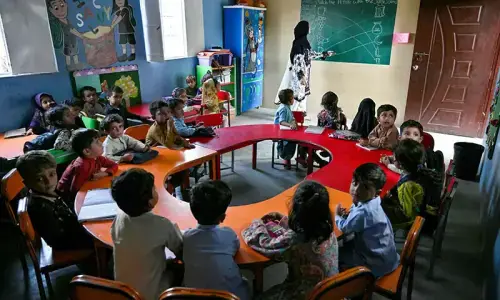RAWALPINDI: For the last over two years, the Punjab Environment Protection Agency (EPA) did not carry out a survey of the Rawalpindi city and cantonment areas for air, water and noise pollution as it remained busy in running the anti-dengue campaigns.
EPA officials here linked the survey with the establishment of the environmental analytical laboratory in the district.
Without any survey, the environment watchdog will not be able to suggest measures for checking the noise and air pollution. The last survey of noise and air pollution in the city was conducted in 2014 when an environment impact assessment report was being prepared for the metro bus project.
Work on the environmental analytical laboratory started in 2010 but it is yet to be completed. Under the law, EPA has to collect water samples from different sources to check its pollution level.
In the 2014 survey, the noise and air pollution was checked at Raja Bazaar, Committee Chowk (Murree Road) and Pirwadhai. The noise and air pollution level was found to be above the national standard.
At Raja Bazaar, the noise level was 75 decibel (db), Committee Chowk (Murree Road) 85 db and Pirwadhai 90 db. The national standard for the noise level is 45-55 db for residential areas, 55-65 db for commercial areas and 65-75 db for industrial areas.
Punjab Environment Protection Agency (EPA) remained preoccupied with anti-dengue campaigns
After conducting the survey, EPA recommended to the provincial government to establish greenbelts and plant trees in these areas as soon as possible.
In its report, the department had said the residents of the areas were in danger of facing hypertension, mood swings and other ailments. “The local administration had been directed to establish parks, plant trees and establish greenbelts,” the report said.
The movement of heavy vehicles is very high at Pirwadhai area but the Parks and Horticulture Authority and the forest department never took any initiative to plant trees in these areas.
A senior official of the environment department told Dawn that the government was yet to increase the staff of the department in Rawalpindi which was not more than 10 officials. Even these officials are kept busy in the dengue surveillance campaigns.
“We spared the months of January and February during which we had to compile reports on the assignments given to us by the Lahore office,” he said.
When contacted, EPA Rawalpindi deputy director Shahid Hasan said the survey for the noise, air and water pollution would be carried out in the city areas soon after the completion of the environmental analytical laboratory.
He said the provincial government had started work on the establishment of the laboratories in major cities and the recruitment of staff was also underway.
He said after the establishment of the laboratories in different cities, EPA would monitor the pollution level in air, surface water and ground water and carry out studies of critical environmental concerns and then take measures for their rectification.
He expressed the hope that by the next month the recruitment of staff would be completed after which the laboratory would become functional.
Published in Dawn, March 27th, 2017






























